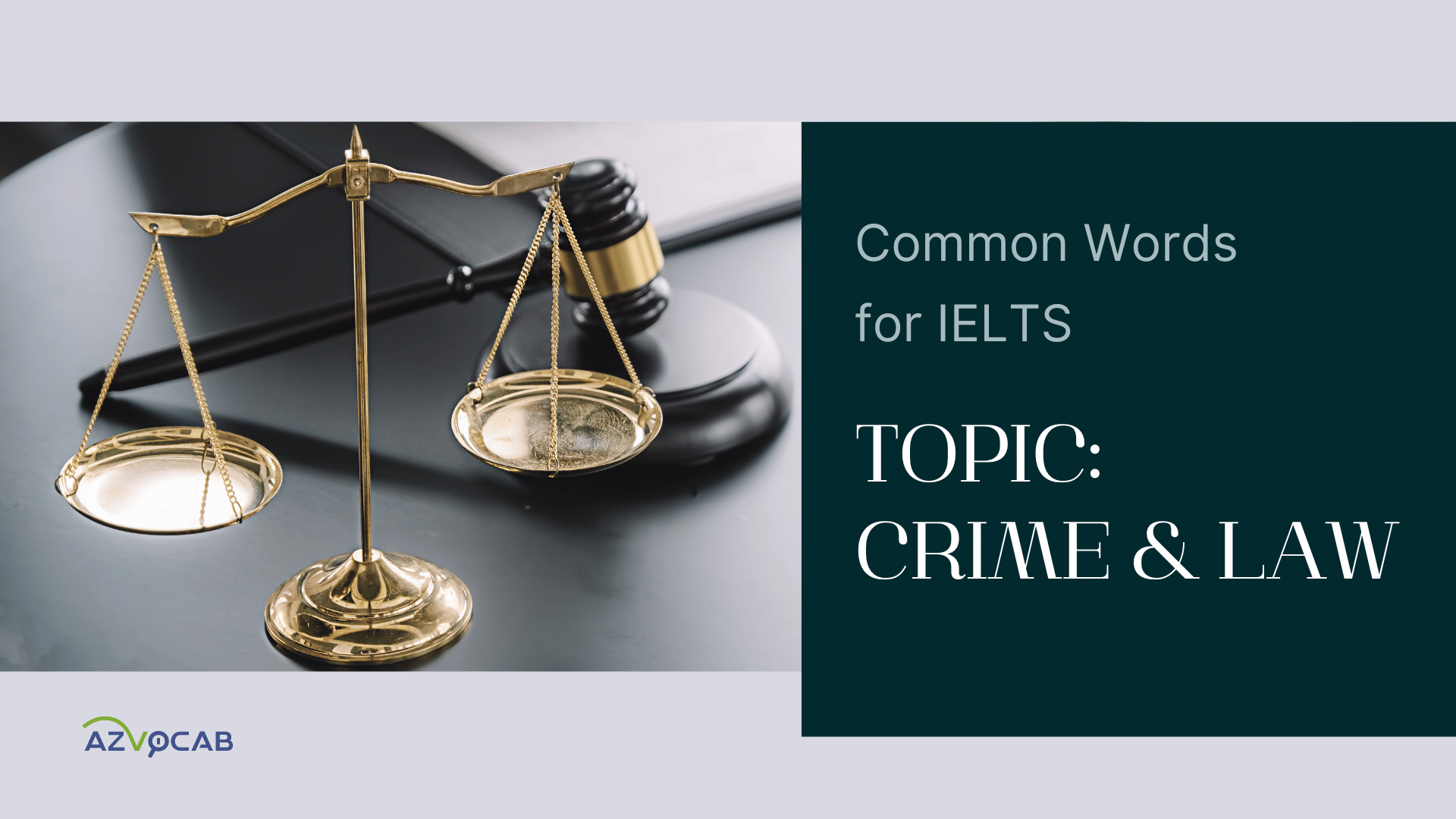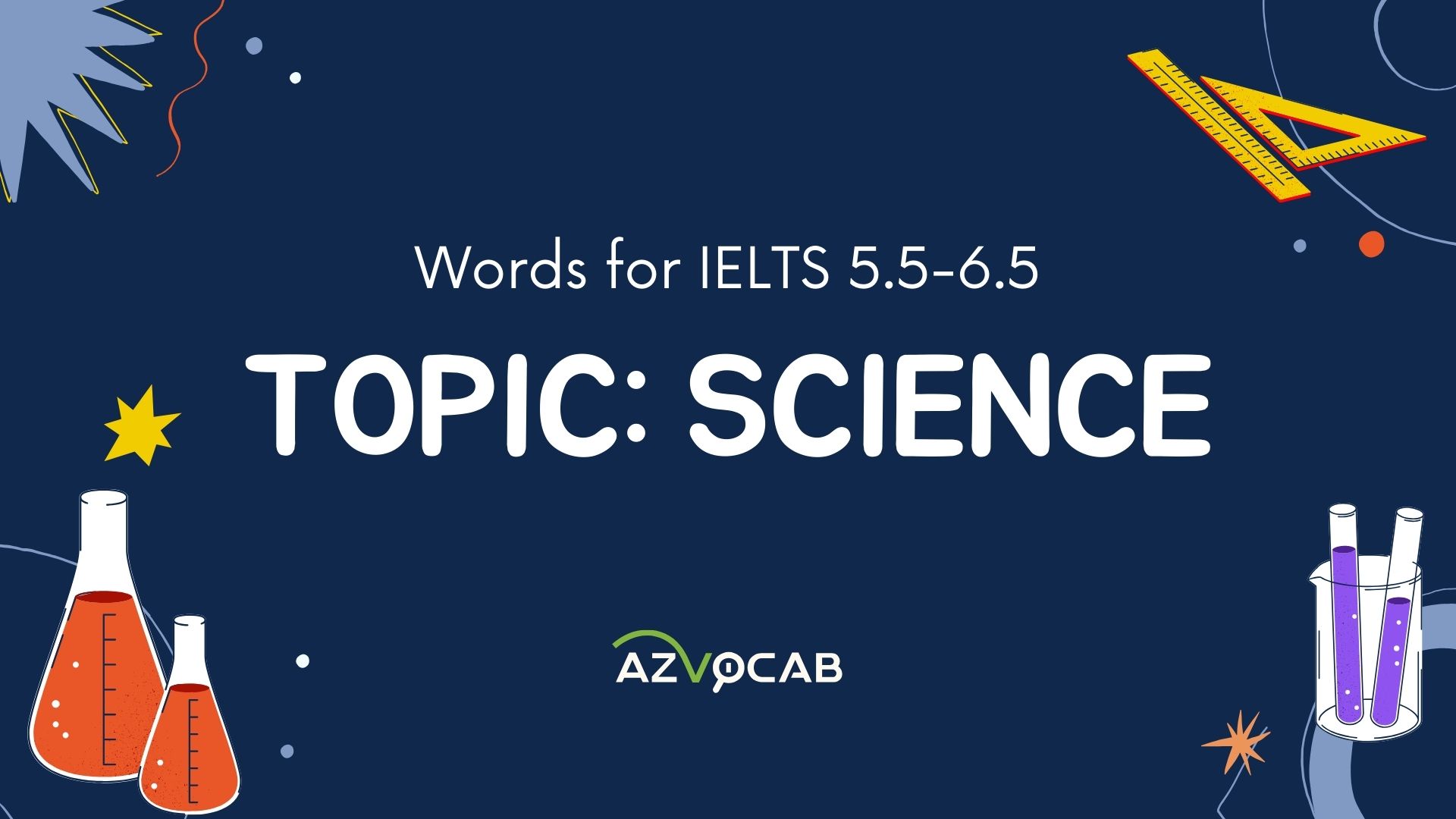90+ Common Words of the Topic Crime and Law for the IELTS exam
30 August, 2023Common words for IELTS

azVocab has compiled over 90 common words on the topic of “Crime and Law” for the IELTS exam. These vocabulary words can be used in all four sections of four skills: Reading, Listening, Speaking, and Writing. azVocab has carefully selected examples that fit specific contexts in IELTS exams. This will help you understand how to use these words in context, increasing the effectiveness of your vocabulary learning.
1. Vocabulary related to criminal behaviors
| arson (n.) – the crime of intentionally starting a fire in order to damage or destroy something, especially a building | Arson is a crime against property, but sometimes people can get hurt as well. |
| burglary (n.) – the crime of illegally entering a building and stealing things | Several men were questioned by police yesterday about the burglary. |
| crime (n.) – illegal activities | Very young children only get involved in crime if they are left alone without any supervision. |
| crime rate (n.) – the number of crimes that are committed during a period of time in a particular place | In the area where I live, the crime rate has increased significantly in the past few years. |
| criminal (n.) – someone who commits a crime | Criminals need to be trained and rehabilitated so that they can enter the workforce. |
| fraud (n.) – the crime of getting money by deceiving people | Despite the convenience of shopping or banking online, there is the problem of internet fraud. |
| inequality (n.) – the unfair situation in society when some people have more opportunities, money, etc. than other people | Research also shows that income inequality correlates to property crime. |
| intent (n.) – the fact that you want and plan to do something | It is our responsibility and duty to protect young people from those with evil intent. |
| intrusion (n.) – an occasion when someone goes into a place or situation where they are not wanted or expected to be | In some countries, the police can enforce laws against crossing the street at the wrong place by imposing a fine. Laws like this are passed simply to keep us safe and some see them as an intrusion on our privacy. |
| kidnapping (n.) – an occasion when someone is kidnapped | The news of the kidnapping was blacked out until the police could find the child. |
| motive (n.) – a reason for doing something | One theory suggests that property crime depends on criminal motives and opportunities to perpetrate crime. |
| mugging (n.) – an act of attacking someone and stealing their money | I’m not afraid of getting stabbed, it’s more muggings, you know, when people grab your bag, stuff like that, I think because of the rising unemployment. |
| murder (n.) – the crime of intentionally killing a person | Nobody could claim that social problems such as murder and traffic deaths resulting from drink-driving are to be accepted as minor issues. |
| offence (n.) – an illegal act; a crime | The offenders involved were exactly matched according to the type of offence they had committed, their prior prison experience and the number of prior appearances in court they had had. |
| organised crime (n.) – criminal activities that are planned and controlled by powerful groups and carried out on a large scale | The extent of the phenomenon is becoming increasingly alarming, and organised crime is increasingly involved. |
| peer pressure (n.) – the strong influence of a group, especially of children, on members of that group to behave as everyone else does | I think that there’s also been an increase in juvenile crime. Partly I think this is through peer pressure – young people are very much influenced by what their friends think of them, and it’s become cool to act like a gangster. |
| petty crime (n.) – a type of crime that is not considered serious when compared with some other crimes | The children might only start with petty crimes but, if they fall in with the wrong crowd and become delinquent, then this can escalate to more serious crimes like robbery or car theft. |
| pickpocketing (n.) – the crime of stealing things out of people’s pockets or bags, especially in a crowd | Petty theft and pickpocketing are becoming increasingly common in the city centre. |
| robbery (n.) – the crime of stealing from somewhere or someone | We are bombarded on an almost daily basis with stories of minorities engaging in crimes such as robbery, murder and rape. |
| smuggling (n.) – the act or process of taking things or people to or from a place secretly and often illegally | The murdered man is thought to have been involved in drug smuggling. |
| swearing (n.) – rude or offensive language that someone uses, especially when they are angry | Some people are offended by swearing on television. |
| toxic waste (n.) – any unwanted material in all forms that can cause harm | I think dumping toxic waste should be made a criminal offence. There is a title to deter people from doing this at the moment. |
| vandalism (n.) – the crime of intentionally damaging property belonging to other people | You only need to look around the streets to see all the graffiti and vandalism. |
| violation (n.) – sự vi phạm, xâm phạm | Traditionally, crime is considered an offence, a violation of public rules or laws. |
| violence (n.) – actions or words that are intended to hurt people | The sale of drugs is organised by armed criminal gangs who illegally traffick drugs and control their business with extreme violence. |
| criminal (adj.) – relating to crime | Government funding for drug and alcohol rehabilitation programmes would help reduce dependency on stimulants and the need for the criminal activity that surrounds them. |
| drug-related (adj.) – associated with or caused by drugs, typically those obtained illegally | Drug-related crime does not end there; drug users often steal to fund their habit, resulting in further acts of petty crime. |
| evil (adj.) – morally bad, cruel, or very unpleasant | Police described the killer as ‘a desperate and evil man’. |
| extreme (adj.) – very large in amount or degree | The sale of drugs is organised by armed criminal gangs who illegally traffic drugs and control their business with extreme violence. |
| guilty (adj.) – responsible for breaking a law | Being guilty of a criminal act usually involves some form of conscious evil intent or recklessness. |
| harsh (adj.) – unpleasant, unkind, cruel, or more severe than is necessary | In conclusion, crime is a major issue, but cracking down on offenders with a harsh penal system is not the only way. |
| hostile (adj.) – unfriendly and not liking something | The prisoner eyed him in hostile silence. |
| violate (v.) – to break or act against something, especially a law, agreement, principle, or something that should be treated with respect | The non-profit Center for Science in the Public Interest has filed suit against the FDA, arguing that the new program violates the 1990 Nutrition Labeling and Education Act, which mandated a higher level of scientific agreement for marketing the health benefits of ingredients. |
2. Vocabulary related to investigation and prosecution
| authority (n.) – a group of people with official responsibility for a particular area of activity | The social system generally consists of an administrative authority that formally deals with crime and a force of representative officers to enforce the laws and act on behalf of society. |
| community service (n.) – work done without payment to help other people. Criminals whose crime was not serious enough for them to be put in prison are sometimes ordered to do community service. | The study suggests that community service may be just as suitable a form of punishment for minor offences. |
| judge (n.) – a person who is in charge of a trial in a court and decides how a person who is guilty of a crime should be punished, or who makes decisions on legal matters | The judge will pronounce the sentence on the defendant this afternoon. |
| jury (n.) – a group of people who have been chosen to listen to all the facts in a trial in a law court and to decide if a person is guilty or not guilty, or if a claim has been proved | A jury should not interpret the silence of a defendant as a sign of guilt. |
| lawyer (n.) – someone whose job is to give advice to people about the law and speak for them in court | If a person is charged with a crime they did not commit, it’s my job as a criminal lawyer to defend them. |
| prosecutor (n.) – a legal official who accuses someone of committing a crime, especially in a law court | Prosecutors have launched a criminal investigation into the firm’s accounting practices. |
| the accused (n.) – the person who is on trial in a law court | The accused protested her innocence. |
| victim (n.) – someone or something that has been hurt, damaged, or killed or has suffered, either because of the actions of someone or something else, or because of illness or chance | If you are a victim of a violent crime, it can take years to get over it. |
| compelling (adj.) – if a reason, argument, etc. is compelling, it makes you believe it or accept it because it is so strong | Forensic evidence makes a suicide verdict the most compelling answer to the mystery of his death. |
| impartial (adj.) – not supporting any of the sides involved in an argument | The jury must be objective and impartial at all times. |
| impracticable (adj.) – if a course of action, plan, etc. is impracticable, it is impossible to do in an effective way | The changes to the tax system proved impracticable as they were impossible to enforce. |
| innocent (adj.) – (of a person) not guilty of a particular crime | He firmly believes that she is innocent of the crime. |
| intentional (adj.) – planned or intended | She felt she was a victim of intentional discrimination. |
| action (n.) – the process of doing something, especially when dealing with a problem or difficulty | Children should be taught to accept the consequences of their actions. |
| evidence (n.) – one or more reasons for believing that something is or is not true | The police have found no evidence of a terrorist link with the murder. |
| investigation (n.) – the act or process of examining a crime, problem, statement, etc. carefully, especially to discover the truth | The government has agreed to launch an official inquiry investigation into the matter. |
| investigative (adj.) – involving examining facts, events, problems, crimes, etc. in order to know more about about them or to discover the truth, or doing work like this | An investigative report showed the drug to be ineffective in fighting the disease. |
| prove (v.) – to show a particular result after a period of time | The lawyer tries to prove the accused is innocent. |
| capital punishment (n.) – punishment by death, as ordered by a legal system | Public opinion was in favour of bringing back capital punishment. |
| fine (n.) – an amount of money that has to be paid as a punishment for not obeying a rule or law | I was given a parking fine again yesterday. It’s costing me a fortune. |
| imprisonment (n.) – the act of putting someone in prison or the condition of being kept in prison | She was sentenced to five years’ imprisonment. |
| life sentence (n.) – the punishment of being put in prison for a very long time, or, in the US, until death | There were a total of 17 people found guilty, including one life sentence in prison. |
| lenient (adj.) – not as severe or strong in punishment or judgment as would be expected | They believe that judges are too lenient with terrorist suspects. |
| imprison (v.) – to put someone in prison | At the moment the only form of punishment we have is to either fine people for petty crimes or imprison them for more serious criminal offences. |
| jail (v.) – to put someone in a jail | He was jailed for four months for drink-driving. |
3. Vocabulary related to law
| consequence (n.) – a result of a particular action or situation, often one that is bad or not convenient | If people commit crimes, then they should be punished and made to accept the consequences of their actions. |
| prevention (n.) – the act of stopping something from happening or of stopping someone from doing something | We also need to focus more attention on crime prevention. |
| prison (n.) – a building where criminals are forced to live as a punishment | It is true that the crime rate is increasing in many areas of the world. Many governments react to this problem by building prisons to contain criminals. |
| convict (n.) – someone who is in prison because they are guilty of a crime | They say perhaps it was an escaped convict who got into the house while Joe was out. |
| prisoner (n.) – a person who is kept in prison as a punishment | Some people feel that this system is not working. Perhaps this is because prisoners mix with other criminals when they are in jail. |
| protection (n.) – the act of protecting or state of being protected | This particular theory relates an increase in crime rate to an increase in crime opportunity and a decrease in protection. |
| punishment (n.) – the act of punishing someone | To solve these problems, governments can either focus on draconian punishments, or improve employment opportunities, invest in good housing projects and tackle drug and alcohol abuse. |
| recklessness (n.) – dangerous behaviour that shows that you are not thinking about the risks and possible results of your actions | The deaths were the result of criminal recklessness. |
| respect (n.) – admiration felt or shown for someone or something that you believe has good ideas or qualities | But I do think that, nowadays, people generally have less and less respect for the rules of society. |
| law-abiding (adj.) – someone who is law-abiding obeys the law | Many law-abiding citizens believe that our existing laws are just not tough enough and do not act as enough of a deterrent against crime. |
| non-violent (adj.) – (of political protest or crime) not involving fighting or the use of physical force | They are changing the law to help protect non-violent offenders from life sentences. |
| offensive (adj.) – causing offence | Swearing is offensive but is not a crime. |
| punishable (adj.) – a punishable crime is one that someone can be punished for | In the winter of 1812, the Frame-Breaking Act was passed, making the destruction of factory equipment a crime punishable by death. |
| random (adj.) – happening, done, or chosen by chance rather than according to a plan | There is always a victim somewhere, even if that victim is a company and its owners. And victims often feel the effects of a crime for many years, whether the attack is planned or random. |
| strict (adj.) – strongly limiting someone’s freedom to behave as they wish, or likely to severely punish someone if they do not obey | The laws in this country are rather strict – even chewing gum is banned. |
| tough (adj.) – severe in limiting what is allowed or in punishing people who do not obey rules or laws | Many law-abiding citizens believe that our existing laws are just not tough enough and do not act as enough of a deterrent against crime. |
| unintentional (adj.) – not intentional | In unintentional cases, such as crimes committed by children or the insane, the criminal is not usually punished in the same manner as in intentional crime. |
| victimless (adj.) – in a victimless crime no one suffers directly, sometimes because the people affected by the crime have agreed to take part in it | Some people believe that non-violent crimes or so-called victimless crimes such as fraud should be punished less. |
| abolish (v.) – to end an activity or custom officially | In recent years there has been a move to abolish laws which were deemed to be too harsh or strict and to reduce the punishment for non-violent crimes, such as those against property. |
| control (v.) – to order, limit, or rule something, or someone’s actions or behaviour | For example, the sale of drugs is organised by armed criminal gangs who illegally traffic drugs and control their business with extreme violence. |
| counter (v.) – to react to something with an opposing opinion or action, or to defend yourself against something | Extra police have been moved into the area to counter the risk of violence. |
| deter (v.) – to prevent someone from doing something or to make someone less enthusiastic about doing something by making it difficult for that person to do it or by threatening bad results if they do it | In fact, these results are consistent with a growing body of evidence suggesting that prison either does nothing to deter offenders or actually increases the risk of re-offending. |
| enforce (v.) – to make people obey a law, or to make a particular situation happen or be accepted | It’s difficult to believe that reducing punishments will help to combat crime. It goes without saying that laws against serious crimes should be strictly enforced. |
| monitor (v.) – to watch and check a situation carefully for a period of time in order to discover something about it | Punishment or other sanctions result from the violation of these laws, and the social system for monitoring and enforcing public rules or laws are put into action. |
| obey (v.) – to act according to what you have been asked or ordered to do by someone in authority, or to behave according to a rule, law, or instruction | Focusing on petty crimes in this way can also cause people who generally obey the law to resent the police rather than respect them for what they do. |
| offend (v.) – to make someone upset or angry | Neither of these volunteers offended his hosts with words. But both of them were unaware of what they had communicated through their non-verbal behaviour. |
| perpetrate (v.) – to commit a crime or a violent or harmful act | One theory suggests that property crime depends on criminal motives and opportunities to perpetrate crime. |
| protect (v.) – to keep someone or something safe from injury, damage, or loss | We can do this by making sure that our property is protected and also by improving the conditions for the poorer people in our society. |
| punish (v.) – to cause someone who has done something wrong or committed a crime to suffer, by hurting them, forcing them to pay money, sending them to prison, etc. | The majority of us would agree that criminals, especially dangerous ones, should be punished. |
| reassure (v.) – to comfort someone and stop them from worrying: | The police have reassured witnesses who may be afraid to come forward that they will be guaranteed anonymity. |
| resent (v.) – to feel angry because you have been forced to accept someone or something that you do not like | We resent these insinuations that we are not capable of leading the company forward. |
| support (v.) – to agree with and give encouragement to someone or something because you want him, her, or it to succeed | Passing laws that require companies to support women’s needs would show that society values women’s contributions, both at home and at work. |
| abide by (phr.v) – to accept or obey an agreement, decision, or rule | We also need to focus more attention on crime prevention and educating young people to abide by the law. |
| deal with (phr.v) – to take action in order to achieve something or in order to solve a problem | Crime can, of course, be dealt with by toughening criminal laws and introducing longer custodial sentences for persistent criminals, but some of the best ways to deal with a crime may be to deal with the social causes. |
| deterrent (n.) – something that deters people from doing something | Tougher prison sentences may act as a deterrent to other would-be offenders. |
The vocabulary of the topic “Crime and Law” is diverse and rich, but not too difficult to memorize. You should break down the topic into smaller parts for more effective learning. Keep following the other vocabulary compilation articles on azVocab for common IELTS vocabulary in various topics.
3193
Share





